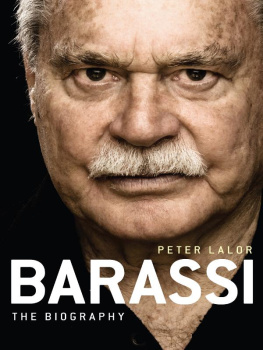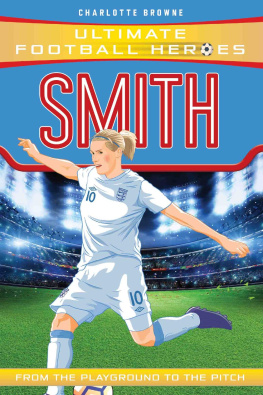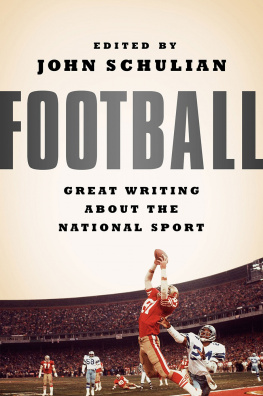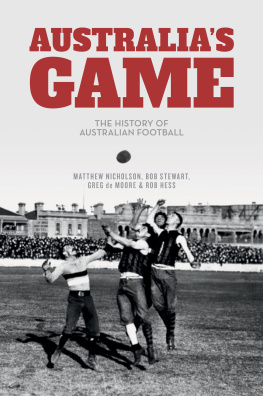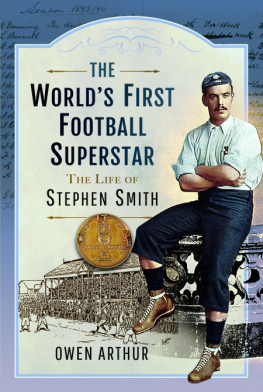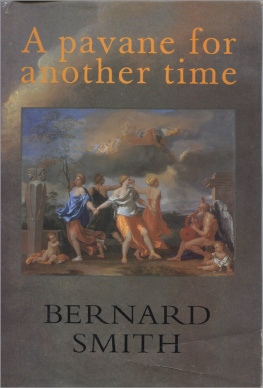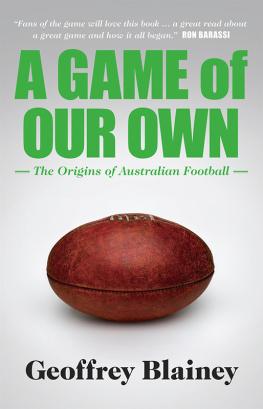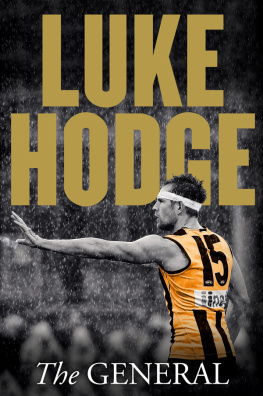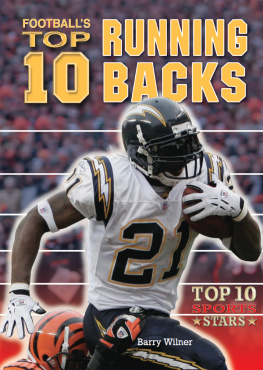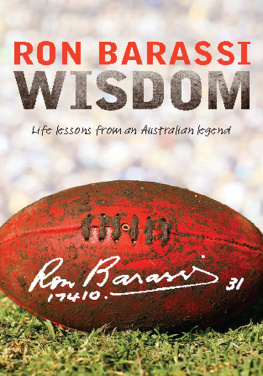BARASSI
PETER LALOR
BARASSI
THE BIOGRAPHY

First published in 2010
Copyright Peter Lalor 2010
All rights reserved. No part of this book may be reproduced or transmitted in any form or by any means, electronic or mechanical, including photocopying, recording or by any information storage and retrieval system, without prior permission in writing from the publisher. The Australian Copyright Act 1968 (the Act) allows a maximum of one chapter or 10 per cent of this book, whichever is the greater, to be photocopied by any educational institution for its educational purposes provided that the educational institution (or body that administers it) has given a remuneration notice to Copyright Agency Limited (CAL) under the Act.
Allen & Unwin
83 Alexander Street
Crows Nest NSW 2065
Australia
Phone:
Fax:
Email:
Web: | (61 2) 8425 0100
(61 2) 9906 2218
info@allenandunwin.com
www.allenandunwin.com |
Cataloguing-in-Publication details are available
from the National Library of Australia
www.librariesaustralia.nla.gov.au
ISBN 978 1 74175 212 0
Set in 11/15 pt Electra LH by Post Pre-press Group, Australia
Printed and bound in Australia by Griffin Press
10 9 8 7 6 5 4 3 2 1

For Mum, who called me in from the backyard to listen to the last half of the 1970 grand final. For Dad, for introducing me to the game. And to Sue, Lucy and Harry for all their patience and support over the years compiling this book.
CONTENTS
INTRODUCTION
Walking on water
INTRODUCTION
WALKING ON WATER
T HE SCREEN FLICKERS high in the stands, a fit old man steps out onto the brightly lit Yarra River. Bearing a torch, dressed in white like a prophet from some strange religion, he sets the jaw, grits his teeth against the tremors in his hands and legs, and continues to walk. On the bloody water, but its not Jesus Christ, its Brass, as they say down these parts, clipping his name back to a single hissing syllable.
On certain occasions hes Ronald Dale Barassi. So familiar that strangers use the second name with the intimate formality of a mother. Not even the birth certificate is hidden from them. You would know that bristling moustache, that set of the jaw, that look that says if it is to be it is up to me. Its the look he got every time the football was in dispute, every time courage was called for, every time a challenge arose, every time a match needed to be won and the side needed him to resuscitate their spirit. Breathe life into their limbs. Raise them up.
Hes not making this look easy. This walking on water business. The effort is always obvious with Barassi. And in truth its no miracle he is remaining above the dark waters, only the ankles of his immaculate clobber wet. Its trickery. Hes edging nervously along a submerged platform, holding the 2006 Commonwealth Games torch so tight therell be grip marks in the metal handle.
Its an in-joke, and everybody born on the right side of the Barassi Line, even a fair few born the other side of it, get the joke. Who knows what the other elite sporting sons and daughters of the Commonwealth will make of it. The Indians will suspect he is some form of guru. Others will look at the flying trams, little boys, poetry and ducks, and conclude that Melbourne has more than fluoride in its water.
Australian football is the religion down here in Victoria. Barassi is its firstborn son, the boy who became its prophet and its messiah. In 1965 the Bulletin ran a cover story that talked of the Barassi cult. He was the hot gospelling coach. The miracle worker who turned sweat into premierships. The evangelist who said the faith must be spread.
The grand final is this tribes judgement day, an annual day of reckoning. And he has gone there 17 times. Winning it is the rapture. Six times as a player he was there as a winner, and four times, with two clubs, he did it as coach.
When he said winning is better, trust me, I know, they trusted him.
He took the tablets from the Smith brothers, Norm and Len, the pair that divined the essence of the game and the sacrifice it required, and he carried them down the mountain.
He was more than a coach. He was the evangelist who pushed for the game to be taken into heathen lands. Calling for the church to root itself in sinful Sydney, even to drive on into the tropics of Brisbane.
They call it the Barassi Line because that is the invisible division imagined by an academic to describe the two tribes of this country. On one side lay those who know Australian Rules, and on the other side lay the others who only knew one thing about footballand that one thing was his name. The spirit was too big to be contained by arbitrary boundaries.
The screen flickers again.
Ron Barassi, it seems, has always been among us, urging us towards heroism, even if it is only to watch and feel better because it exists.
Ronald Dale Barassi emerged from the topography of Australian history. Heroism and football were coded into his DNA.
Grainy black and white images flash across the screen.
Images of muddy premiership celebrations and death on the battlefield in Tobruk. The first Ron Barassi done too soon, the boy sent to the bush and raised on the hard ground, silhouetted by the light, reared among the straggling migrants left behind from the gold rushfrontier people burnt hard. Great-grandma, an English rose transplanted to the colony, gave birth in a slab hut to the first white baby ever seen in those parts. Great-grandpa Giuseppe brought his foreignness to a most foreign place.
The boy left alone on the dirt road, kicking the ball and retrieving it, pitched in battle against himself. Yearning for a place where there are enough kids to form a team. A league. A crowd.
The football journey is a movie script. Dads jumper, a lonely bungalow for the teenager at the back of the stern coachs home in the city, the failures and the flash of inspiration that saw No. 31 come to symbolise the fierce determination of the game. The set of the jaw again. The clenched fist. The fanaticism. The eras and the colours change. A red-leg no more, he becomes a blue-belly, a Shinboner and then a swan and there is endless ticker tape. Champagne filters through the bristling moustache and pours down the chin onto that alpha male chest, and the images come thick and fast. Endless miles of newsprint stretch out, around the continent and back, every page another Barassi story. A car crash. A fiery clash with Brent Tiger Crosswell. A spray at the umpires, a jostle with the opposition coach. This grand final. That grand final. The relentless, pitiless pursuit of victory. A call to arms. The game must test its boundaries, but Ron Barassi has no limits.
He keeps pushing into time. If it is to be it is up to me. A public figure he is elevated and venerated, but he is forever slapping away hands that would pat him on the back. He is forever Barassi. Urging and challenging. Himself alone and ageing now. He scrabbles the Kokoda Track crab-like. Knees that wont let him walk forward force him sideways, lurching with a hip and shoulder charge against the mountainous jungle. The 70-year-old knocks aside a hand offered by a guide as they cross a river on a slippery log, just as he had knocked away the hand of a young player as he struggled to get up in the last of his 254 games. A Mongolian bike ride. A charity walk. State and national awards. But he is forever Ron and sometimes he flashes back. The muscles twitch beneath the crisp shirt, itching to be in a sleeveless jumper. Thirty-one on its back. New Years Eve 2008 he is crashing a pack again. Flying across a St Kilda footpath, he brings a young punk down and the gang turns on him in the gutter with their boots. He grimaces into the camera the next morning, a latter day Clint Eastwood, bruised and bloodied. Must get that shoulder seen to. It is news so big it is relayed around the world. He still resonates. At 72, Ron Barassi stepped up to save a woman and when he fell down they kicked him. Do you need to know anything else about how far weve fallen? You dont piss on statues and Rons already cast in bronze outside the MCG, a towering icon putting his high-laced boots through the ball in a classic pose.
Next page
